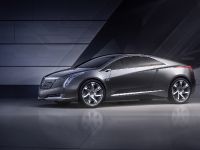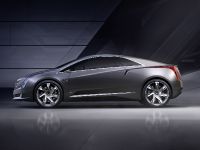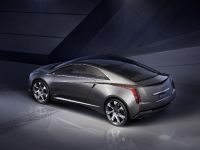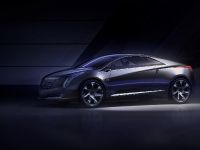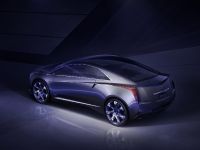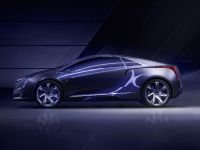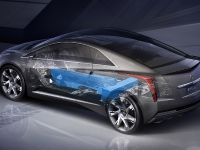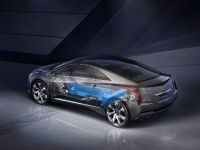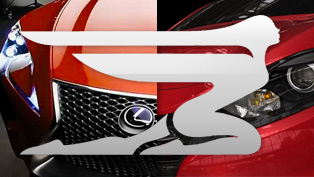Converj: The “Cadillac” Of Electric Vehicles
General Motors unveiled a further glimpse at the potential of electric propulsion today, this time in the form of luxury transportation, with the Cadillac Converj Concept. The Cadillac Converj was developed as a well-appointed grand touring coupe with a bold design and a host of interactive technology.
The four-passenger Converj concept is intended to show how GM's revolutionary electric propulsion technology – called Voltec – can power a luxury coupe with a typically Cadillac "no compromises" design. The technology enables up to 40 miles of gas- and emissions-free electric driving with extended-range capability of hundreds of miles.
Bob Lutz, GM's vice chairman of Global Product Development, said the Converj concept has production substance. "It's a logical extension of our plan to reinvent the automobile," he said. "It clearly shows what a Cadillac electric vehicle could look like, and clearly indicates that global luxury customers can have a car that has both strong design and electric propulsion with a total range of hundreds of anxiety-free miles."
Cadillac's extended-range electric vehicle (E-REV) concept has a new body style that is an evolution of the brand's traditional Art and Science design theme. An aggressive, forward-leaning arc profile is the foundation for the sporting stance. And more than a Cadillac in form, Converj is also intended to be a Cadillac in substance, with the premium materials, technology and driving dynamics that are hallmarks of the brand.
Voltec – innovative propulsion technology
The Cadillac Converj's Voltec electric propulsion system is made up of a 16-kWh, T-shaped battery, an electric drive unit, and a four-cylinder engine-generator. It uses electricity as its primary source to drive the car.
A thermally managed battery pack contains more than 220 lithium-ion cells that provide the primary power to drive the Converj electrically up to 40 miles without using fuel or producing tailpipe emissions. The battery is integrated into the Converj's chassis and stores electricity from the grid when the vehicle is plugged in. It takes less than three hours to recharge the battery at 240V, or about eight hours from a 120V outlet.
When the battery's energy is low, the Converj seamlessly switches to extended-range mode. During this secondary level of operation, electricity needed to power the vehicle is created on-board by a flex-fuel-powered engine that operates much like a home generator to create electricity. The engine-generator ensures a constant supply of power for hundreds of miles until the car is refueled or plugged in to recharge the battery. This extended-range mode eliminates the range anxiety that comes with driving pure electric vehicles that offer no backup power when the battery charge is low.
Whether in electric or extended-range mode, the Converj is propelled all the time by an electric drive unit. It converts electrical energy from the battery or the engine-generator into mechanical energy to drive the front wheels. It also delivers 273 lb.-ft. (370 Nm) of instant torque, for a quick launch, and 120 kW of power. The top speed is 100 mph.
There is no compromise in vehicle performance in either mode of operation. To enhance the ride feel, the Converj also features GM's Magnetic Ride Control; and for even greater efficiency, energy during braking is captured and stored in the battery.
Pure Cadillac design
There's no mistaking the Converj for anything but a Cadillac, according to Lutz. "An aggressive, forward-leaning profile hints at a new, progressive theme and proportion in Cadillac's design evolution," he says. "The new proportion showcases a uniquely shaped, modern vision of a personal luxury 2+2."
The overall shape is reinforced by a prominent, sweeping body line with large, 21-inch (front) and 22-inch (rear) wheels pushed to the edges of the body. The Converj exterior is painted a dark silver tri-coat that GM designers dubbed "Reaction."
An all-glass roof incorporates solar panels that help offset power drain from the vehicle's accessories. Additionally, several aerodynamic and design efficiencies were incorporated to enhance the driving range, including:
* A full under-vehicle cover (belly pan) * Minimal grille openings that reduce drag at the front of the vehicle * Low-profile rearview cameras replace conventional outside mirrors to reduce drag * Wheels are shaped to push air outward for smoother body side airflow
The Converj also incorporates vertical headlamp and taillamp elements, with light pipe technology.
"Vertical lamps are Cadillac signatures and the Converj builds on the brand's light pipe technology with bolder light emitting diode (LED) and high-intensity discharge elements front and rear," said Clay Dean, global design director for Cadillac. "There is also a unique daylight light ‘spear' at the top of the headlamps."
Luxury meets technology inside
The Converj's interior has advanced features and luxurious appointments blending efficiency and environmental consciousness. The 2+2 configuration is trimmed in contrasting Winter White synthetic suede – including the top of the instrument panel – and Midnight Black leather, with polished aluminum and wood grain accents. Renewable materials are used throughout such as wool-blend carpeting, a headliner made from silk, suede made from post-industrial content and more. A technologically advanced driver center increases efficiency and reduces the draw on the battery. Features include:
* New, organic light-emitting diode technology used on reconfigurable instrument cluster * Touch-screen navigation, climate, center-stack controls and audio systems * Adjustable, overhead white ambient lighting * Unique "power on" sequence featuring blue-lit console graphics * Screen displays for features including regenerative braking, battery charge level and power output * No inside rearview or outside mirrors; cameras provide surrounding images on a screen placed high on the instrument panel for a full, panoramic view * Push-button ignition and power-folding front seats
SPECIFICATIONS
General
| Vehicle type: | 2-door, front-wheel drive 2+2 coupe |
| Category: | extended-range electric vehicle |
| Chassis: | independent MacPherson struts, front magnetic ride, compound crank twist axle rear, four-wheel disc brakes, full regenerative brakes to maximise energy capture, electric power-assist steering |
| Seating capacity: | four |
Performance
| Top speed (mph / km/h): | 100 / 161 |
| EV range, city and highway (miles): | Up to 40, based on EPA cycle |
Dimensions
| Wheelbase (in / mm): | 108 / 2742 |
| Length (in / mm): | 182 / 4620 |
| Width (in / mm): | 74 / 1883 |
| Height (in / mm): | 55 / 1386 |
Battery system
| Type: | lithium-ion (w/ liquid-controlled thermal management system) |
| Energy (kWh): | 16 |
| Charge time: | Less than 3 hours at 240V/8 hours at 120V |
Electric drive unit
| Power (kW): | 120 |
| Torque (lb-ft / Nm): | 273 / 370 |
Exterior
| Tyre size: | specially developed low rolling resistance tyres on 21- and 22-inch forged aluminium wheels |
